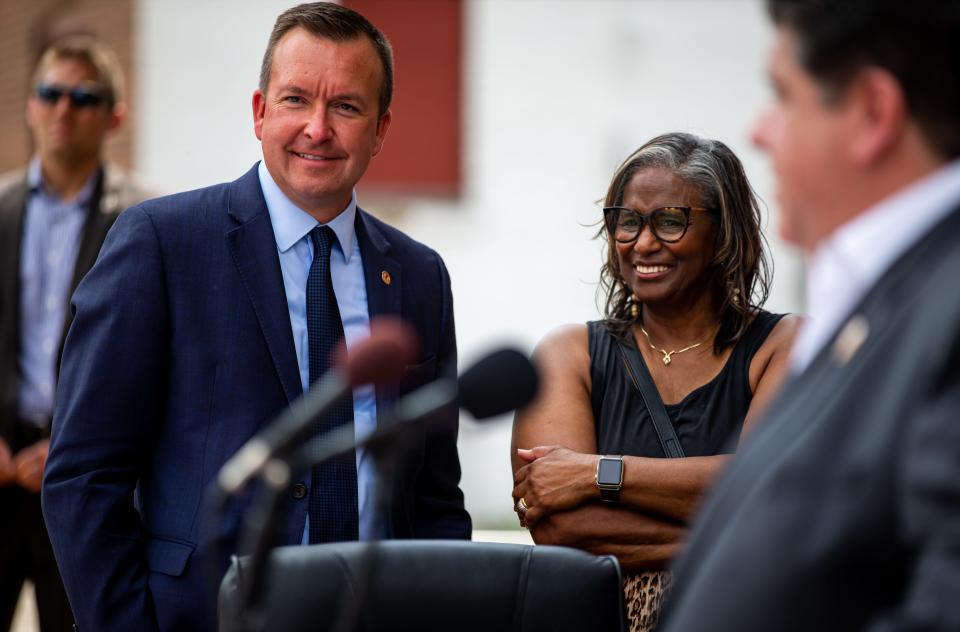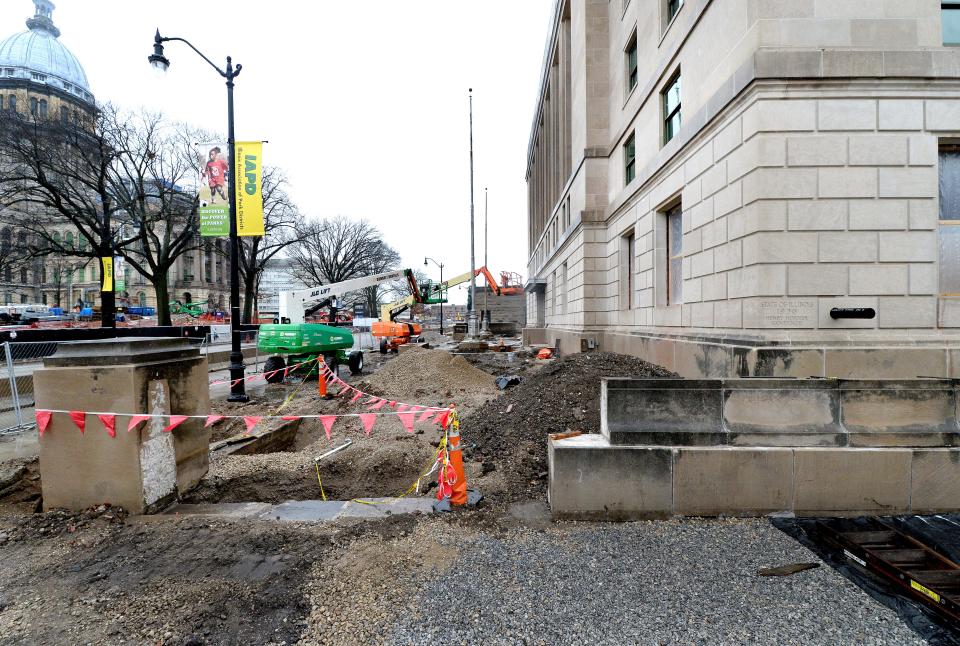Rev. King spoke at the Illinois State Armory in 1965, his visit will be commemorated
- Oops!Something went wrong.Please try again later.
- Oops!Something went wrong.Please try again later.
The Rev. Martin Luther King Jr. may never have made it to Springfield except for a unique set of events.
King delivered his only Springfield speech to some 4,000 delegates − and apparently a few curious State of Illinois employees − at an AFL-CIO convention at the Illinois State Armory on Oct. 7, 1965.
A bronze plaque will commemorate the visit sometime after a three-year, $122 million renovation on the downtown Armory is completed by mid-2025.
Doss retiring as Lanphier High School principal on Feb. 27
Several events in Springfield pay tribute to King, whose birthday is marked Monday.
King's Springfield speech spoke to the intersection of the labor movement and the fight for civil rights, said State Sen. Doris Turner, D-Springfield, who helped champion the memorialization of the speech.
By the time of his appearance, King was a nationally recognized civil rights leader.
But King almost didn't make it to Springfield.
Longtime AFL-CIO president Reuben Soderstrom, who first met King in Florida in 1961, invited him to speak at Illinois’ 1963 convention, said longtime labor journalist and Soderstrom biographer Chris Stevens of Peoria. Instead, King sent friend and mentor Ralph Abernathy.
King was scheduled to speak at the gathering in Peoria in 1964, but he was tending to his ill father, the Rev. Martin Luther King Sr., and President Lyndon B. Johnson stepped in, Stevens said.
The state convention rotated between cities and Springfield was hosting when King accepted in 1965, Stevens said.
King flew from Atlanta to Chicago and then on to Springfield. Early in the speech, King noted the choppiness of the flight. "I am always happy to get on the ground. I don't want to leave you with the impression that I don't have faith in God in the air. It is simply that I have had more experience with (God) on the ground."
King also acknowledged he was in the city of Abraham Lincoln, "the man whose sacred memory will remain a part of our thoughts as long as there is any memory in this great nation."

Bishop Jacson L. Moody studied King's theology at Morehouse School of Religion but wasn't familiar with the Springfield speech until he moved to town.
Moody, the pastor of the Redemption Center church in Springfield, recreated the speech at the Springfield and Central Illinois African American History Museum in 2018.
Moody said one particular line still resonates with him: King's call for a guaranteed annual wage.
"That's not something people are really thinking about," Moody said. "We don't mind talking about minimum wage as far as hourly, but he called for a guaranteed annual wage. That was unheard of. With that, he was arguing it was a basic human and moral right. That's major."
While King had "no fear of speaking truth to power," Moody said, others, including some clergy members, weren't as intent on hearing his message.
"As beloved as King is now, and history has been kind, in the moment there were people who didn't care for what they determined was his radical thought process," Moody said. "King was on the right side of history and speaking out on those things and sharing that there was a line that correlated the civil rights movement into wage rights and labor rights but also end of the struggle for underpaid workers. It was one straight line for him. There was nothing that was mutually exclusive."
King, Moody said, also incorporated parts of the "I Have a Dream" speech into the Springfield speech and at the end used the familiar "free at last" refrain, "a calling card for King."
Stevens, who has researched King's speech and appearance in Springfield, said he tried to track down an audio recording of the speech to no avail.
While the speech was only open to credentialed delegates, an account by the Illinois State Register (an afternoon paper and a forerunner to The State Journal-Register) said several state workers on their lunch hour took in the speech.
Stevens was told that King may have been targeted here.

Robert G. "Bob" Gibson, the Illinois AFL-CIO community services director at the time, had to hustle King out of the Armory after the speech, said Stevens, because a bomb threat was phoned into the Armory.
Stevens said Gibson, who went on to serve as the state labor union's president, recounted the story in an interview shortly before he died in 2021.
Stevens said Gibson recalled driving King around to various Abraham Lincoln sites in Springfield when the bomb threat was made known.
King didn't return to the Armory, Stevens noted and took a flight out of Springfield the same day.
While the newspaper didn't mention the bomb threat, it did report that King had plans to return home after the speech.
Another newspaper story also mentioned that King addressed a news conference before he left.
Turner and Robert Peters, D-Chicago, helped pass a Senate Joint Resolution officially acknowledging the commemoration of King's speech first advanced in 2020 by Turner's predecessor, State Sen. Andy Manar, D-Bunker Hill. Manar, who worked with Illinois AFL-CIO president Tim Drea in drafting the resolution, is now the state's deputy governor.
The seven-story Armory, which dates from 1937, will be used for state offices once renovations are complete.
Turner, speaking earlier this week, said the resolution caught her interest shortly after she was appointed to fill Manar's 48th District seat in February 2021.
"It was very important for me to see it through just because of the importance of the subject matter," Turner said.
Another monument in Springfield to King, a statue across from the Illinois Capitol Building that was vandalized on Sept. 11, 2022, may make it back to Freedom Corner by the spring.
Max Walczyk, a spokesman for the Illinois Secretary of State, said in an email Thursday that a Chicago-based restoration company is nearly finished with making repairs the statue.
Turner said there wasn't an exact line item for the plaque but that "funds will be found."
The commemoration was important, Turner said, on a personal note.
"I believe the labor movement really worked hand-in-hand to build the middle class and in a lot of ways I am a direct product of that partnership because my father (Thomas Porter, who worked at Allis-Chalmers, later Fiat-Allis) was a very proud UAW member," Turner said. "I know first-hand what that union membership meant to my family, meant to my mother even after my father died. So I think it's really important to commemorate that.
"If you look at all of the big moments that Dr. King had, you will see labor with him."
Contact Steven Spearie at 217-622-1788; sspearie@sj-r.com; or X, twitter.com/@StevenSpearie.
This article originally appeared on State Journal-Register: King's 1965 speech in Springfield will be memorialized with a plaque

